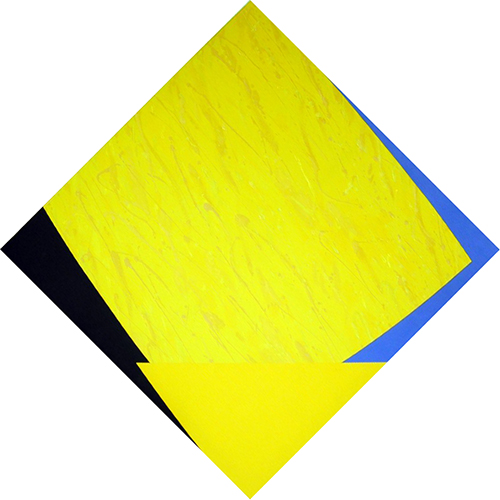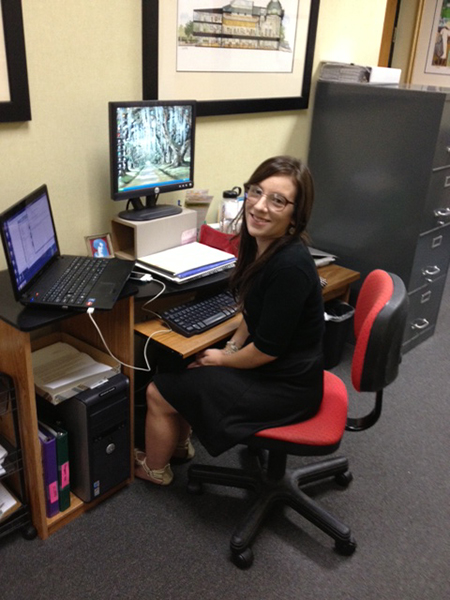At the start of each day of my summer internship at Gibbes Museum of Art, I walk past Michael Tyzack’s Days Beyond Recall on my way into the office. It is great way for any person enthusiastic about visual arts to start their day, but lately, this part of my routine has taken on more meaning.
Since the start of my Master of Library and Information Science program, change has been a reoccurring motif, and one that I cannot help but contemplate frequently, especially now that I myself am in the midst of a lot of changes taking place in my own life… Today is my 26th birthday. I am now a Reference Librarian at my alma mater, College of Charleston, working at Addlestone Library. Tomorrow marks two and a half years of being married to my husband, an art educator in Colleton County School District. The last day of my internship at Gibbes is only 15 days away. In just 20 days, I will turn in my final project for Humanities and Art Information Services—my last course in the MLIS program. And in 24 days I will graduate from The University of South Carolina.

So, I am in a transitional stage of sorts, and I suppose this has led to a significant amount of reflection. My thoughts about the future are much like Tyzack’s painting—bright and alluring, though nonetheless abstract.
The title of the piece, Days Beyond Recall, denotes a time that has long since passed. I see now that my days as a student are coming to a close. And slightly to my chagrin, I admit that I am growing up and will probably continue to do so. I see that this time in my life will soon be a part of my past. However, I can’t see how these days could ever be beyond my recollection of them. They are far too memorable. And after all, everything I have worked at thus far will contribute to my future, whatever it may hold. Still, the unknown that comes with change can be daunting at times. I have found that focusing on what I know about change can help me cope.
Much of my graduate curricula and the LIS profession have revolved around a notion of embracing change. Technology and the overall realm of information are now tremendously different, among other things. In any case, if libraries are to continue to meet the needs of the communities they serve, they must adapt and develop new services accordingly. Succeeding at this can mean improvement. Information settings can then encourage intellectual and personal growth more effectively.
Art museums are no exclusion. As an emerging information professional, I have enjoyed being at the Gibbes this summer, and seeing an undertaking of such a valuable transformation in real life. The museum, as you may know, is preparing not only for being physically under construction, but there are also plans for re-branding. The goal is to make the Museum more relevant to its community, and to enhance the experience of visitors through reform of educational services and visual art information services.

Perhaps you are wondering how a Public Programs & Marketing internship pertains to a LIS student. Although I may not be specifically handling books, I am most certainly working with information. Careers in Library and Information Science are evolving beyond their traditional forms. To remain valuable, it will be important to think of our work and skills more broadly. My summer reading—Rethinking Information Work: A Career Guide for Librarians and Other Information Professionals by G. Kim Dority—has been teaching me this. So, the value of a non-traditional LIS internship experience in a world immersed in change is an important one that has helped me to diversify my skill set.
Over the summer, there have also been changes in my understanding: I have learned how my research skills can support the development of the Gibbes’ brand, exhibitions, and programs. I have seen firsthand how information can be used and made available in ways that engage the Museum’s visitors and enhance its web presence and overall visibility in the eye of the public. Most importantly, I now realize how my specialization can help to advocate for the Gibbes, and foster its community’s love of art and culture.
Despite all of these changes, I feel that some things will remain as they are. The core values will persist—those of both the LIS profession and Gibbes Museum of Art. Also, my own values—my love for art and lifelong learning are still intact, perhaps even more so than ever before—I am just learning how to apply them in new and meaningful ways.
Just as we change, so can the way we see and respond to art. This is similar to rereading a book. We often will gain something different from the experience because we are at a different stage in our lives. I look forward to discovering new meaning upon viewing Days Beyond Recall in the years to come!
—Alison Paul, public programs and marketing intern and guest blogger
[Written July 17, 2013]
Published August 2, 2013

